Gardening Tips for Growing Your Own Medicine Cabinet.
Discover essential gardening tips for cultivating a backyard pharmacy with herbs and plants for natural remedies and wellness at home.
Ever stood in front of a medicine cabinet wishing for natural remedies? Imagine picking fresh herbs from your own backyard instead.
With the right gardening tips, you can grow healing plants and make your own natural solutions at home—no pharmacy required.
There's something special about growing your own remedies. It mixes the beauty of gardening with natural health.
This guide is for those who want to turn their garden into a pharmacy. Medicinal herbs like lavender and chamomile are not only good for you. They also make your garden look beautiful.
This adds peace to your space. It makes your garden a place for natural health all year. Whether you know a lot about gardening or are just starting, we'll help you. We'll show you how to grow these powerful plants. This way, your family will always have natural remedies.
Key Takeaways
- Transform your garden into a natural pharmacy.
- Experience the dual benefits of beauty and therapy.
- Gain year-round benefits from medicinal herbs.
- Learn essential tips for sustainable herbal gardening.
- Boost your family’s health with natural remedies.
Why Grow Your Own Medicinal Herbs?
Many people are growing their own medicinal herbs at home. It's not just a trend. It's a way to save money and use natural remedies. You can also make your home look beautiful.
Cost Savings
Imagine not going to the pharmacy all year. Growing your own herbs saves money. Cost-effective healthcare is possible with a small garden or a few pots.
With a little money upfront, you get endless fresh herbs. It's a smart investment.
Fresh and Pure Sources
When you grow your own herbs, you know they're safe. No bad stuff is added. You control how they're grown. This means you get the best health benefits.
It's like having your own tiny pharmacy. You can use the herbs right away.
Culinary Crossover Benefits
Many medicinal herbs are great in cooking. They make your food taste better and are good for you. Herbs like basil and rosemary are culinary herbs.
They make your meals healthier and tastier. It's a win for your health and taste buds.
Home Aesthetic Enhancement
Herbs also make your home look better. They can be in pots on a windowsill or in your garden. They create a peaceful, green space.
This space is good for your mind and body. It's not just pretty; it's healthy.
| Benefits | Details |
|---|---|
| Cost Savings | Reduces the need for expensive over-the-counter remedies. |
| Fresh and Pure Sources | Ensures the herbs are free from pesticides and contaminants. |
| Culinary Crossover Benefits | Enhances meals with flavorful, health-boosting herbs. |
| Home Aesthetic Enhancement | Creates a beautiful, tranquil living environment. |
Choosing the Right Medicinal Herbs
When you start your medicinal herb garden, picking the right herbs is key. You need to choose between perennial herbs and annual herbs. This choice affects how easy and sustainable your garden will be.
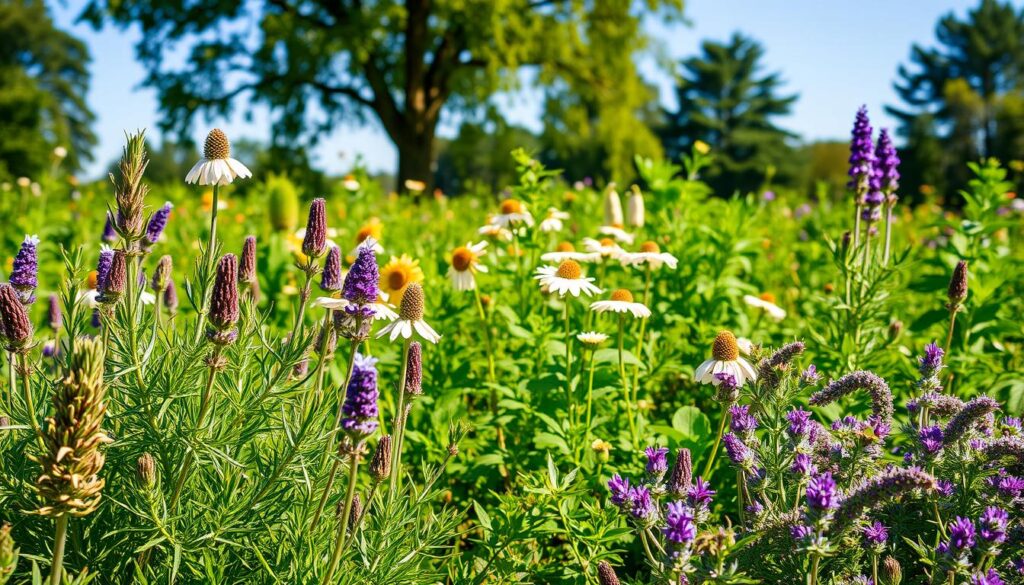
Perennials vs. Annuals
It's important to know the difference between perennial herbs and annuals. Perennials, like echinacea and thyme, grow back every year. They give you a steady supply without needing to replant.
Annuals, like basil, need to be replanted each year. But they can give you a big harvest in just one season. Mixing both types makes your garden rewarding and sustainable.
Herbs for Common Ailments
Having herbs for common health issues is smart. Peppermint and lemon balm are great for your stomach. Echinacea boosts your immune system.
Grow these herbs to have natural remedies ready all year.
Herbs Suitable for Your Climate
It's important to choose herbs that fit your local climate. This ensures they grow well and produce a lot.
Oregano and sage are tough and grow in many places. But basil needs warmer weather. Knowing your climate helps your herb garden thrive.
For more tips on growing medicinal herbs, check out this helpful guide.
Planning Your Medicinal Herb Garden
Starting a medicinal herb garden is rewarding. It lets you have fresh herbs always. We'll talk about garden design, planting friends, and space.
Year-Round Garden Design
Make your garden work all year. Mix plants that grow in different seasons. This keeps your garden busy all year.
Perennials like lavender and sage are great. They look good and are useful.
Companion Planting
Companion planting helps your garden grow better. For example, basil near tomatoes keeps pests away and helps tomatoes grow. This makes your garden healthier and uses space well.
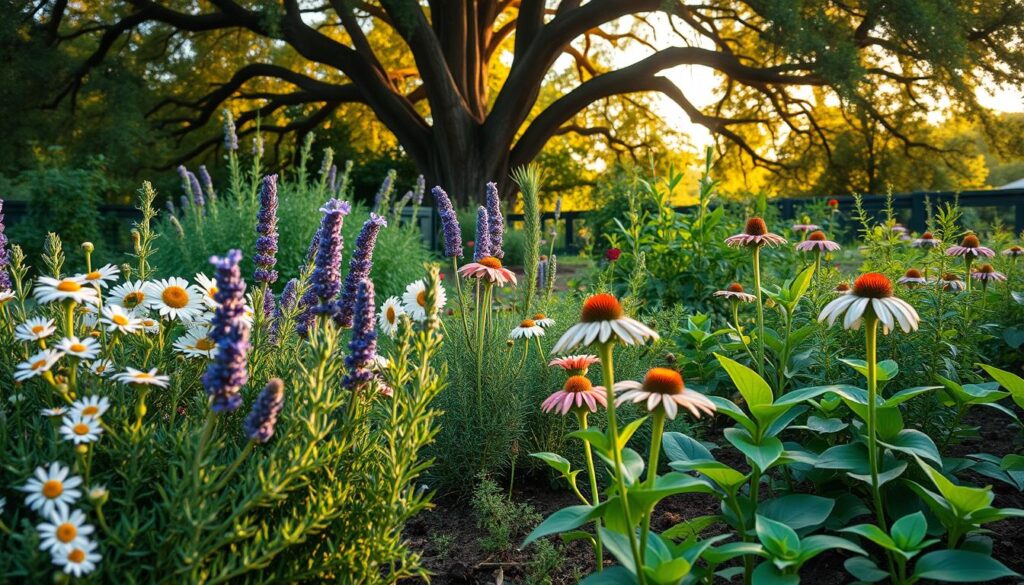
Space Considerations
Don't worry about small spaces. You can garden smartly. Try vertical planting or using pots.
Herbs like mint and parsley grow well in pots. This makes harvesting easier.
Here's a quick overview of space-efficient gardening techniques:
- Raised Beds: Great for small spaces, creating a growing area.
- Vertical Gardens: Good for walls and small corners, using space up.
- Container Gardening: Flexible and easy to move, for changing plants.
Gardening Tips for Success
Want to make your garden a lush oasis? Here are some tips for better soil, smart watering, and natural pest control. These will help your garden grow well.
Soil Preparation
Soil is magic for your garden. Start by adding compost or aged manure. This makes the soil rich and helps your herbs grow strong.
Have you noticed how tasty veggies and herbs are from good soil? They taste better and look more vibrant.
Watering Techniques
Watering can be tricky. Use methods that keep the soil just right, not too wet or dry. Drip irrigation is great for this.
It's nice to see your herbs looking fresh and healthy. The right water makes all the difference.
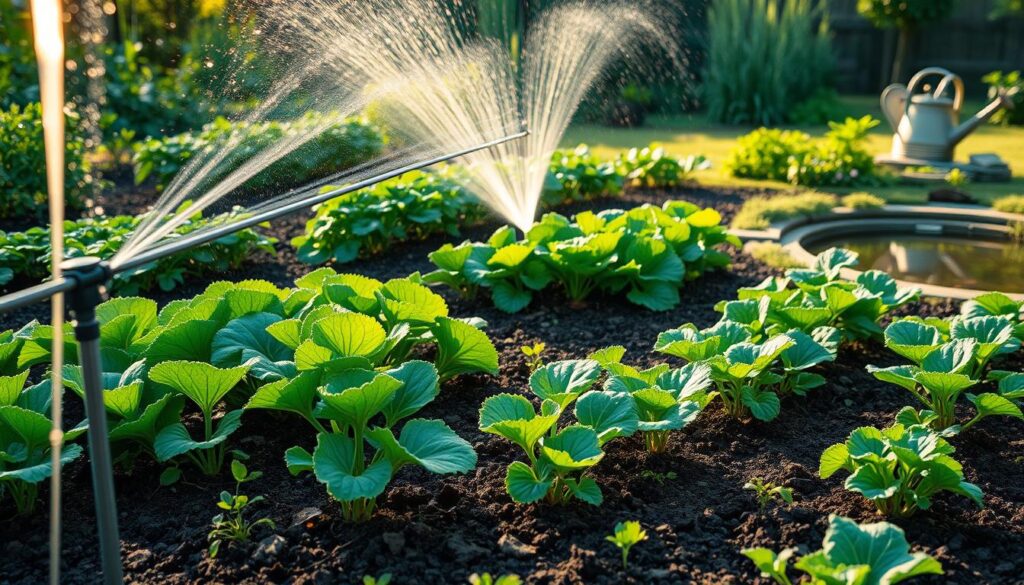
Weeding and Pest Control
Dealing with weeds and pests? Go natural! Use beneficial insects like ladybugs or lacewings. They help keep pests away.
Try companion planting too. This means growing plants that keep pests off your herbs. Organic mulch also helps keep weeds away and makes the soil better.
Imagine a garden full of strong, healthy plants without pests. That's the dream, right?
Best Herbs for Respiratory Health
Exploring respiratory health herbs opens doors to natural remedies. These can improve your well-being. Echinacea, mullein, and thyme are among the best herbs for this.
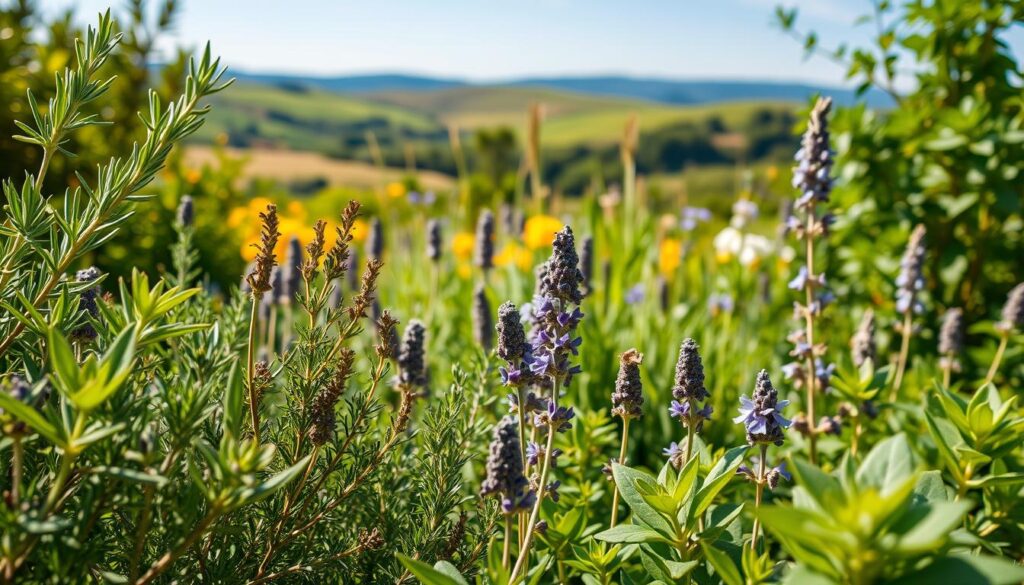
Echinacea
Echinacea is amazing! It boosts your immune system. It helps with colds and coughs, making it a top natural cough remedy.
Mullein
Mullein is great for coughs and congestion. Try mullein tea for relief. It calms airways and clears mucus, a key respiratory health herb.
Thyme
Thyme is also powerful. It helps clear mucus and soothes the respiratory tract. It's a strong natural cough remedy to have around.
| Herb | Benefits | Uses |
|---|---|---|
| Echinacea | Boosts immune response, reduces respiratory infection symptoms | Teas, tinctures |
| Mullein | Soothes coughs, reduces congestion, clears mucus | Teas, infusions |
| Thyme | Clears mucus, soothes respiratory tract, acts as an expectorant | Teas, culinary use |
Herbs for Digestive Health
Growing your own herbs can be very rewarding. Learning about different digestive support herbs has changed my wellness routine. 🌿
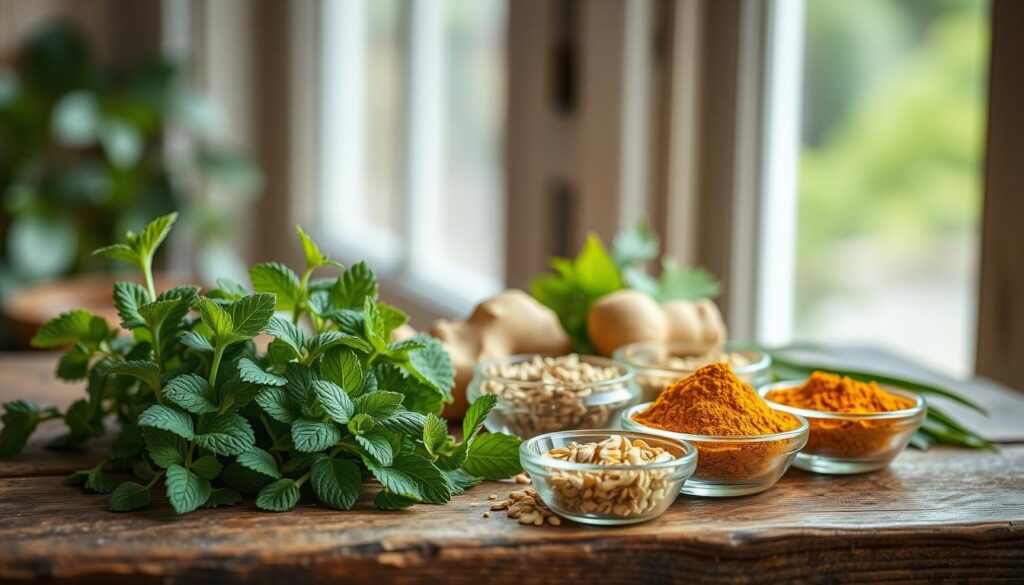
Peppermint is great for easing bloating and indigestion. It's easy to grow and tastes refreshing in teas and dishes. Have you tried peppermint tea after eating a lot? It really helps!
Ginger is another favorite of mine. It's known for fighting nausea. You can grow it in pots, making it perfect for small spaces. Ginger tea soothes your stomach and adds a spicy kick to your day.
Chamomile is also fantastic. It makes a calming tea that soothes your stomach and helps you relax before bed. Drinking chamomile tea is a great way to calm down and get a good night's sleep.
| Digestive Support Herb | Benefits | Best Use |
|---|---|---|
| Peppermint | Relaxes digestive tract, reduces bloating | Tea, culinary uses |
| Ginger | Anti-nausea, soothes stomach | Tea, cooking |
| Chamomile | Calms stomach, aids sleep | Tea |
These herbs are not only effective but also easy to grow at home. With a little care, your garden can become a natural pharmacy. It will provide you with these amazing natural digestive remedies.
Herbs for Immune System Support
Want to make your immune system stronger? Three herbs are great for this: elderberry, garlic, and astragalus. They help keep you healthy at home.
Elderberry
Elderberry is a top choice for fighting colds and flu. It's full of antioxidants and vitamins. These help your body fight off sickness.
Garlic
Garlic is full of health benefits. It fights infections and keeps you well. Eating garlic helps your body stay strong.
Astragalus
Astragalus is an adaptogen that helps your body handle stress. It also boosts your immune system. This herb is great for staying healthy.
Preparing Your Herbs for Use
Ready to use your garden's herbs? Learning how to process them is key. This way, you get the most health benefits and keep them fresh longer. Let's explore drying, infusing, and making herbal tinctures.
Drying Techniques
Drying herbs is important. It lets you enjoy them all year without needing a fridge. You can air dry or use a dehydrator. Air drying is simple: just bunch herbs and hang them in a dark, airy spot.
Infusions and Teas
Making herbal teas is a joy. They're more than just a drink. They're a way to boost your health. Just steep fresh or dried herbs in boiling water for a few minutes.
Creating Tinctures
For strong remedies, try herbal tinctures. They're concentrated and effective. Use alcohol to preserve them, making them easy to carry. Just put herbs in a jar, cover with alcohol, and wait a few weeks.
Drying, making teas, and tinctures improve your herb skills. Let your garden be your source for natural remedies! 🌿
Container Gardening for Small Spaces
If you love plants but have little outdoor space, container gardening is the way to go. It's great for city gardens and small spaces. It works well in apartments or homes with tiny balconies. Here's how to make the most of your indoor herb gardens.
Best Herbs for Containers
Choosing the right herbs for container gardening is key. Some herbs grow well in containers and taste great. They also have health benefits. Here are some top picks:
- Basil: Adds fresh flavors to food and helps with stress.
- Mint: Makes refreshing teas and helps with digestion.
- Parsley: Is full of vitamins and boosts your immune system.
These herbs do well in small containers. They can turn your home into a mini garden.
Indoor Growing Tips
Want to improve your indoor herb garden? Here are some tips I've found:
- Container Size: Choose containers that are 6-12 inches deep. This lets roots grow well.
- Soil Type: Use good potting mix that drains well. You can find indoor herb garden mix at garden centers.
- Positioning: Put your containers in the sun for 6-8 hours. A sunny windowsill is perfect!
Follow these tips, and your small garden will grow well. It will turn even the smallest space into a big garden.
Seasonal Care and Maintenance
Keeping a garden all year means changing how you garden with the seasons. It's key to know the seasons and what they need for the best garden.
Spring Planting Tips
Spring brings new life to your garden. Here's how to plant well in the spring:
- Prepare the soil: Start by tilling the soil and adding organic compost to enrich it.
- Plan your planting schedules: Consider the last frost date in your area to avoid planting too early.
- Choose suitable herbs: Early spring is ideal for planting basil, parsley, and mint.
Spring planting sets a strong base for your garden as it grows.
Fall Harvesting Advice
As days get shorter and cooler, it's time to harvest herbs and get ready for winter. Here's what you need to know:
- Harvesting herbs: Collect herbs like oregano, rosemary, and sage before they flower for the best flavor and potency.
- Drying techniques: Use drying racks or hang bundles of herbs in a well-ventilated area.
- Storing herbs: Store dried herbs in airtight containers in a cool, dark place.
Harvesting herbs in the fall gives you fresh herbs through winter.
Winterizing Your Garden
Winter can be tough, and your garden needs protection. Here's how to winterize:
- Protect perennials: Mulch around the base of perennial herbs to insulate their roots.
- Clean up: Remove any debris or dead plants to prevent pests and diseases from overwintering.
- Maintain healthy soil: Add a layer of organic matter to keep soil nutrients intact over winter.
By following these tips, you can have a thriving herb garden all year. Adjust your planting and enjoy each season's special things!
Using Medicinal Herbs Safely
Using medicinal herbs can be great for your health. But, it's key to do it safely. Many people choose herbal remedies to avoid synthetic drugs. Yet, without proper guidance, it's easy to misuse these natural treatments.
Consulting with Healthcare Professionals
Before starting with herbal medicine, talk to healthcare experts. They know what's best for you and make sure herbs won't mix badly with your meds. A quick talk with a pro can prevent a lot of trouble.
Proper Dosage and Usage
Now, let's talk about the right amount of herbal medicine. Many think natural means safe in big amounts. But, that's not true. Herbal remedies are strong, and too much can cause bad side effects. Getting the right dose from a healthcare expert is vital for safe use.
Here’s a quick rundown of some guidelines:
- Always start with the lowest recommended dose and monitor your body's reaction.
- Follow specific preparation methods for each type of herb.
- Keep track of the frequency of your doses to avoid overconsumption.
By following these tips, your herbal medicine journey will be safe and helpful. So, next time you think of adding a new herb, remember these guidelines!
Resources and Further Learning
Starting your journey in herbology opens a world of natural remedies. There are many educational resources to help you learn. These resources can make your understanding and skills better.
Books by Rosemary Gladstar are great for beginners. Her book “Medicinal Herbs: A Beginner’s Guide” is a good start. “A Kid’s Herb Book for Children of All Ages” is also great for teaching kids about herbs.
The Herbal Academy has online courses for herbal studies. Their website has lots of info and learning paths for all levels. It's a great place to learn more.
Workshops and community gardens like the VGN’s Community Teaching Garden are great for practice. You can learn by doing and share with others. Charlie Nardozzi’s website, www.gardeningwithcharlie.com, has easy tips and videos.
Mountain Rose Herbs’ blog has inspiring recipes and advice. It's a valuable resource for learning about herbs. Combining books, online courses, and workshops gives you a full understanding of medicinal herbs.
Here is a quick comparison of some valuable resources:
| Resource | Type | Focus |
|---|---|---|
| Rosemary Gladstar’s Books | Books | Beginner to Intermediate Herbal Remedies |
| The Herbal Academy | Online Courses | Comprehensive Herbal Studies |
| VGN’s Community Teaching Garden | Workshops | Hands-on Practice |
| Mountain Rose Herbs Blog | Blog | Recipes and Practical Advice |
| Gardening with Charlie | Articles/Videos | Quick Gardening Tips |
With these resources, your journey into herbal studies will be fun and enlightening. Start exploring and learn about nature's pharmacy.
Growing Your Own Herbs
Our journey through the benefits of medicinal gardens shows it's great for your health. Growing your own herbs saves money and brings fresh flavors right to your kitchen. It also makes your garden space lively and fun.
Gardening is more than just growing plants. It's about connecting with nature and getting some exercise. You also get to enjoy the fruits of your labor, literally. This hobby changes your garden and your life for the better.
Keep learning and growing your garden. You're gaining knowledge that helps you stay healthy naturally. Don't stop here. Add more to your garden and make these practices a part of your daily life. Your own medicine cabinet will be a big help to your health and happiness.


